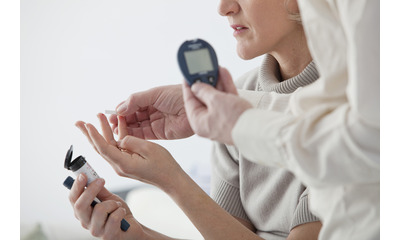Diabetes is a chronic metabolic disorder that affects the body’s ability to produce or use insulin, resulting in high levels of glucose in the blood. It is a prevalent condition affecting millions of people worldwide, and its incidence is on the rise. Diabetes is commonly associated with complications, such as cardiovascular disease, neuropathy, retinopathy, and nephropathy. However, recent research suggests that diabetes may also be related to hearing loss.
Several studies investigating the relationship between diabetes and hearing loss, suggest there is a link between the two conditions, although the evidence is inconclusive. Diabetes-related hearing loss is common with damaged small blood vessels in the inner ear that reduces blood flow and nerve damage. High blood glucose levels reportedly also cause oxidative stress, inflammation, and damage to the sensory cells in the ear.
The impact of hearing loss on individuals with diabetes can be significant, affecting their quality of life and ability to manage their diabetes effectively. Hearing loss can also make it difficult to communicate with healthcare providers, hear warnings, and recognize low blood sugar symptoms, which can lead to poor self-management of diabetes.
Continue reading to understand the potential relationship between diabetes and hearing loss to prevent or manage both conditions effectively.
What Are the Dangers of Diabetes and Hearing Loss?
Diabetes and hearing loss are two medical conditions that are often associated with each other. In fact, studies have shown that people with diabetes are more likely to experience hearing loss than those without the disease. The reason for this connection is still not fully understood, but experts believe that high blood sugar levels and poor circulation in the body can damage the small blood vessels in the inner ear, leading to hearing loss over time.
One of the dangers of diabetes and hearing loss is that they can both have a significant impact on a person’s quality of life. People with hearing loss may find it difficult to communicate with others, especially in noisy environments or on the phone. This can lead to social isolation, depression, and anxiety. Similarly, diabetes can also affect a person’s mental health, as well as their physical health.
Another danger of these two conditions is that they can often go unnoticed and untreated for long periods of time. Many people with diabetes may not even realize they have the disease until they experience complications such as hearing loss. Similarly, hearing loss can often be gradual, and people may not realize they have a problem until it becomes severe.
In addition, both diabetes and hearing loss can increase a person’s risk of other health problems. For example, people with diabetes are more likely to develop cardiovascular disease, kidney disease, and nerve damage. Hearing loss has also been linked to cognitive decline, dementia, and falls in older adults.
Fortunately, there are steps that people can take to reduce their risk of developing these conditions and manage them if they do occur. For diabetes, maintaining a healthy diet, exercising regularly, and monitoring blood sugar levels can all help to prevent complications. Similarly, for hearing loss, using hearing aids and avoiding exposure to loud noises can help to prevent further damage to the inner ear.
In conclusion, the dangers of diabetes and hearing loss are significant and should not be taken lightly. People who have diabetes should be aware of the potential risk of hearing loss and take steps to monitor their hearing. Similarly, people who experience hearing loss should consider getting screened for diabetes and other health problems that may be related. By taking proactive steps to manage these conditions, people can improve their overall health and quality of life.
How to Lower the Risk of Diabetes-Induced Hearing Loss
Diabetes and hearing loss are two health conditions that can be challenging to manage, but there are steps you can take to reduce your risk of developing them. Here are some ways to lower your risk of diabetes and hearing loss:
Maintain a healthy lifestyle: A healthy lifestyle is key to preventing diabetes and hearing loss. This includes eating a balanced diet, exercising regularly, getting enough sleep, and avoiding harmful substances like tobacco and excessive alcohol.
Monitor blood sugar levels: If you have diabetes or are at risk of developing it, it’s important to monitor your blood sugar levels regularly. This can help you identify and manage high blood sugar levels early on, which can prevent complications like hearing loss.
Protect your ears: Exposure to loud noises can damage the delicate hair cells in the inner ear, leading to hearing loss. Protect your ears by wearing earplugs or noise-canceling headphones when exposed to loud noises, and avoid prolonged exposure to loud sounds.
Get regular hearing screenings: Regular hearing screenings can help you identify hearing loss early on, before it becomes severe. This is especially important if you have diabetes, as you may be at a higher risk of developing hearing loss.
Manage other health conditions: Health conditions like high blood pressure and high cholesterol can increase your risk of developing diabetes and hearing loss. Work with your healthcare provider to manage these conditions and keep them under control.
Consider hearing aids: If you do experience hearing loss, consider getting hearing aids. Hearing aids can improve your ability to communicate with others, reducing social isolation and other risks associated with hearing loss.
In conclusion, the key to lowering your risk of diabetes and hearing loss is to maintain a healthy lifestyle, monitor your health regularly, and take steps to protect your ears and manage any health conditions you may have. By being proactive about your health, you can reduce your risk of developing these conditions and improve your overall quality of life.
To learn more about hearing loss-related disorders or to schedule an appointment for a hearing assessment, contact CV/ENT Surgical Group today!

